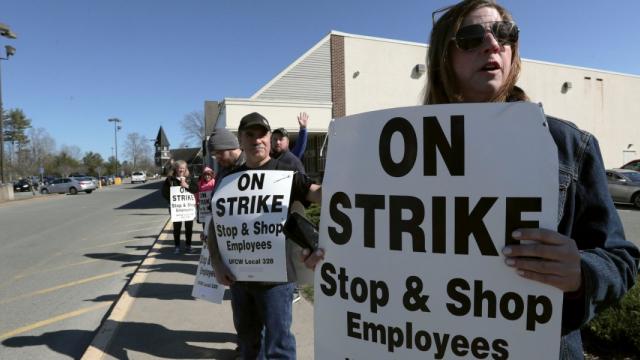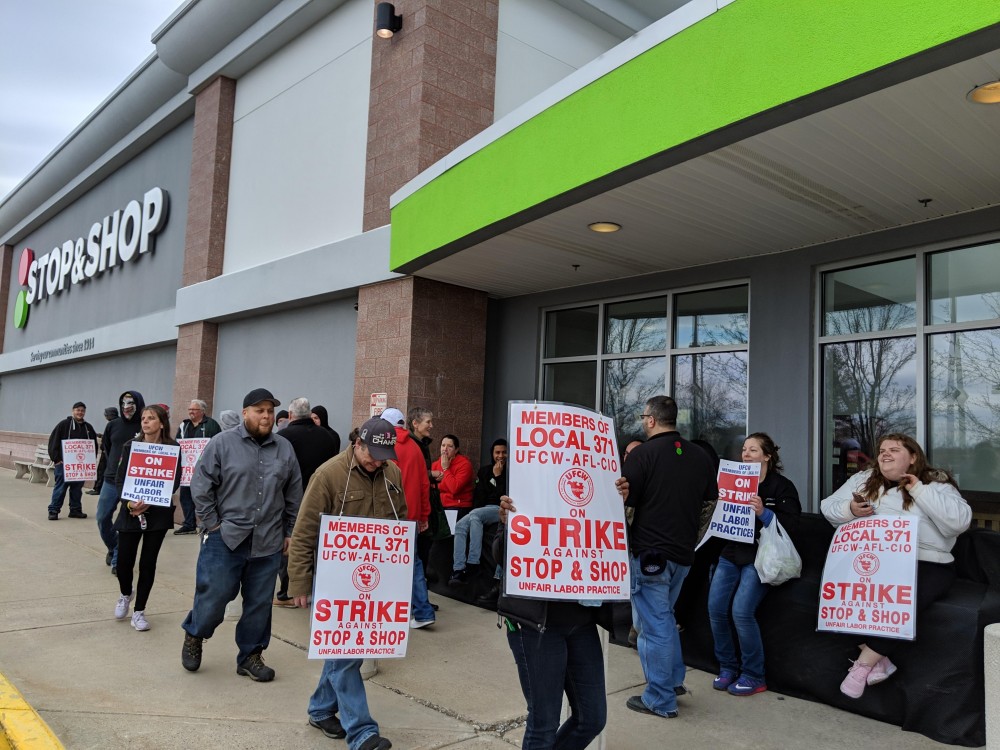
Editor's note: On Sunday, April 21, the Stop and Shop Supermarket Company and the five locals of the United Food and Commercial Workers union, or UFCW, representing workers throughout the store’s 240 New England locations reached a tentative agreement. Workers returned to work Monday, April 22, and over the next few days will be reviewing and voting on the new contract with management.
The year 2018 saw a major increase in labor activism compared with the past couple of decades, most notably the teacher strikes across multiple states. That trend has continued in 2019 and deepened with significant strikes in the private sector.
In February, 1,700 workers at the Webtec locomotive plant in Erie, Penn., went on strike to protest new management’s attempt to reduce benefits in their new contract. The union termed this strike the “first major US manufacturing strike of the Trump era.” (The strikes were suspended after several days as part of a 90-day cooling off period.) Then, in mid-April, 30,000 workers of the Stop and Shop grocery chain in New England walked out during new contract negotiations.
One of largest private sector strikes in years, the Stop and Shop action was brought on by corporate attempts to cut healthcare and retirement benefits. The union has argued that management can well afford to pay workers what they are worth given the corporation’s rising profits and stock buy-backs.
Another strong motive for the workers is resisting attempts by management to impose a two-tier system that would give new hires and part-time workers a less beneficial compensation package. As activist Jane McAlevey tweeted, the two-tier system is “one of the smartest boss tactics to kill a union.”
If management were able to impose a two-tier system, it would be able to play off veteran workers against new hires and thereby undermine the union’s bargaining power. What is especially notable about the ongoing strike is that Teamster-affiliated truckers have refused to cross the picket lines. As a result, store shelves have become increasingly bare and store trash is not getting picked up.
Strikes and the Democratic primary campaign
The timing of the 2019 strikes during the Democratic primary campaign is a huge boon for organized labor. Many of the Democratic candidates have expressed support for workers. Former Vice-President and apparent candidate Joe Biden joined the Stop and Shop strikers this past week.
Senator Elizabeth Warren, with doughnuts in hand, also made an appearance at a rally, stating that “Unions built America’s middle class — unions will be rebuilding America’s middle class.” Several weeks earlier, Warren had made a gesture toward organized labor by kicking off her presidential bid in Lawrence, Mass., site of the epic 1912 Bread and Roses strike by textile workers.
Bernie Sanders has long been an outspoken advocate for organized labor and the current strikes are no exception. The Vermont senator supported the Erie machinists, tweeting that “Americans are sick and tired of corporate America and their wealthy CEOs ripping off working families.” He has also expressed his support to the Stop and Shop strikers, criticizing management’s attempt to cut compensation.
Warren and Sanders, along with their senate colleague and presidential candidate Kamala Harris, supported LA Teachers as did all of the ten Democrats representing parts of Los Angeles. Harris also supported her hometown Oakland teachers.
Perhaps more notable, Democratic National Committee Chair Tom Perez came out in support of the LA teachers, even though other centrist Democrats have been on the side of the charter movement, most prominent among them Rahm Emanuel, former mayor of Chicago, and Arne Duncan, Education Secretary in the Obama administration. Unlike most other Democrats, Duncan actually supportedthe school board in LA against the union.
Taken together, recent Democratic support for labor continues the party’s turn away from the Clinton “third way” towards a more progressive politics. This trend, which was sparked by Bernie Sanders’ 2016 campaign, has been on display for the past few years with widespread support for Medicare or All, the Green New Deal, a $15 dollar an hour minimum wage, and family supports such as free preschool and college tuition.
The intersection of the 2019 strike wave with the Democratic primary gives unions and workers greater leverage in shaping the Democratic agenda than at any time in the past generation or two. This trend has been helped by the relative decline in importance of corporate contributions versus small donors to election campaigns.
Sanders in 2016 and 2020 has eschewed corporate money as has Sen. Warren. The trend has also been strengthened by the reverberations of the 2016 general election when Democrats lost the formerly dependable industrial states of Michigan, Wisconsin and Pennsylvania. In Erie County, site of the Webtec strike, the normally Democratic stronghold went from Obama by 16 points in 2012, to Trump by two points in 2016.
Since then, Democrats have been working to win back some of the industrial working class exemplified by the Erie factory workers.
But the biggest factor giving unions and workers more clout in Democratic politics – and pushing the party to adopt more populist economic positions – is the strikes themselves. By organizing and standing up for their rights, workers have forced Democratic politicians to take more assertive pro-labor and pro-working class positions.
As McAlevey has often said, workers going on strike is the best way to force progressive political change. This worker-party dynamic is being played out at present and is likely to continue for the rest of the campaign to the benefit of organized labor.
Where things stand
It is quite likely that we are still at the beginning of a new era of labor activism. All indications point to 2019 being just as big as 2018 if not bigger. The strikes in Erie and in New England are evidence that workers in the private sector are beginning to exercise their strike muscles again. So is the third attempt by the United Auto Workers (UAW) to establish a union at the Volkswagen plant in Chattanooga, TN.
Meanwhile, the school strikes continue. Teachers in Sacramento, CA staged a one-day strike on April 11; North Carolina teachers look to be walking out on May 1; and Oregon teachers are walking out May 8, while teachers in Maine have rallied for legislation giving them the right to strike.
As far as teacher strikes go, there are many unresolved issues from 2018 as teacher demands for more funding for public education have run headlong into state financial challenges due to austerity and give-aways to fossil fuel and other corporations. A long-term win for teachers means fully funding public education, which itself requires a major reorientation of state budgets. That, in turn, requires that popular forces take on corporate power in states across the country, a broad objective shared by both public and private sector workers.
The 2018 midterm elections saw the beginnings of such change at the state level with the flipping of several governorships and victories in state legislatures. In addition, teachers – especially in Oklahoma – started to get directly involved in state politics. The strikes have clearly created openings for a more progressive politics in many states and cities.
This transformation, as it plays out, will likely be gradual and uneven. But as long as teachers and other workers stay strong in their support for public education and workers' rights, the terrain will continue to shift in a more progressive direction, making further advances possible.














